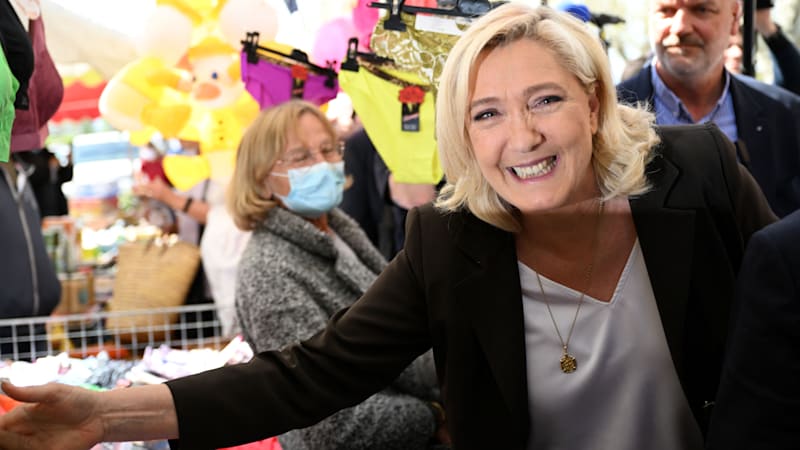Le Pen puts fuel-tax cut, wind crackdown at heart of France energy plan

As Europe suffers its worst energy crisis in a generation, French presidential candidate Marine Le Pen is proposing to subsidize consumption while further curtailing supply.
The 53 year-old nationalist is narrowly trailing President Emmanuel Macron in polls ahead of the April 24 runoff election. She has campaigned for months on a promise to boost voters’ purchasing power by cutting taxes on gasoline, heating oil, natural gas and electricity. This help for consumers sits alongside a crackdown on wind turbines, a windfall tax on some of the country’s largest energy companies and an exit from Europe’s electricity market.
While energy costs began rising last year, Russia’s invasion of Ukraine has pushed them to the top of the political agenda as prices broke records. Those increases represent more than half of Europe’s inflation, costing households across the continent some 230 billion euros ($251 billion) this year.
Le Pen has cast herself as the protector of the poor, and her policies may prove to be effective at harnessing the pain of rising prices felt by households and motorists. Their concerns have been a powerful force in French politics, notably the “Yellow Vest” movement that disrupted the early years of Macron’s presidency.
Yet her plans would leave the country increasingly exposed to energy shortages over time, according to Marc-Antoine Eyl-Mazzega, the head of the Center for Energy & Climate at Institut Francais des Relations Internationales.
“It may please those who don’t like the sight of wind turbines,” Eyl-Mazzega said. “The power supply situation will deteriorate, and investors will shy away from France.”
The core of Le Pen’s pitch to voters is a 12-billion euro reduction in the value added tax on energy. She also promised to roll back 9 billion euros in levies on diesel and gasoline when she takes office if the price of oil is above $100 a barrel. Those giveaways would come on top of the 25 billion euros of aid to contain energy bills already being phased in by Macron.
The tax cuts would be partly financed by ending subsidies for wind and solar power, Le Pen said. Regardless of legal issues, she also promised to halt onshore and offshore wind farms under construction, putting at risk projects currently in development by companies including Electricite de France SA, Engie SA, Iberdrola SA, Neoen SA and Voltalia SA. Wind turbines would be progressively taken down when they reach “the end of their life,” according to her manifesto.
Wind and solar together represented 10% of France’s electricity output last year, and this proportion will probably rise further this year as EDF’s nuclear output is set to drop to the lowest level since 1990 because of maintenance and technical issues at its aging fleet of nuclear reactors. Yet wind turbines are unpopular in some parts of France, where homeowners argue that they are unsightly and reduce the value of their properties.
Macron has taken some steps to address opposition to wind power, pushing back a target to double onshore capacity by 20 years to 2050. But the idea of completely blocking the development of domestic sources of renewable power, which have become increasingly price-competitive as the cost of imported fossil fuels and other sources of electricity has surged, has been fiercely criticized.
“The economic and energy policy proposals are out of touch with reality,” Michel Gioria, the general delegate of France Energie Eolienne, the country’s wind power federation. “She’ll plunge France into a difficult situation in terms of energy supply, which will keep prices high.”
Le Pen plans to solve the supply side of the energy equation by launching the construction of 20 large nuclear power plants, which would come progressively online from 2031. She would also seek to re-open the two Fessenheim reactors that Macron shut two years ago, prolong the lifetime of EDF’s 56 operational atomic plants to 60 years, and build some small modular nuclear generators.
That’s a challenging timetable given the recent record of France’s nuclear industry. EDF still hasn’t commissioned the sole new reactor under construction in the country, at Flamanville, after 15 years of works. The project has been dogged by technical issues and has quadrupled its initial budget to 12.7 billion euros.
Macron’s nuclear plan is to build as many as 14 new large nuclear reactors, with the first pair coming online from 2035. Given supply-chain constraints and modern safety standards, even that more modest proposal brings considerable challenges, France’s power-grid operator said last year.
Fossil dependence
The president also wants France to build 50 offshore wind farms by 2050, and has called for a tenfold increase in solar power and a doubling of onshore wind. Both candidates support the widespread use of in the coming decades of hydrogen, a fuel that has yet to be proven commercially viable.
Le Pen called Macron’s plan “the largest waste of public money” that will require to France to rely on gas-fired power plants when the wind isn’t blowing or the sun isn’t shining. His target to reduce France’s energy consumption by 40% by the middle of the century is “unreachable,” she said.
President Vladimir Putin’s invasion of Ukraine highlighted the geopolitical vulnerability caused by Europe’s heavy dependence on imported Russian fossil fuels. Le Pen’s policies would entrench this position, said Nicolas Goldberg, an energy consultant at progressive think tank Terra Nova.
“If we can’t meet our electricity demand because of a moratorium on renewables or extravagant hypotheses on nuclear power, we’ll have to keep using fossil fuels,” Goldberg said in a note. “Not only would the climate suffer, but also the purchasing power, because this fossil-energy crisis would only worsen during her mandate.”
Related video:







